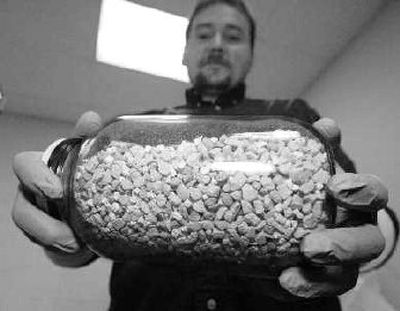Miner still short on safety equipment

MONROEVILLE, Pa. — At first glance, everything seems to be going well for CSE Corp.
Sales of the emergency air packs CSE pioneered for coal mining are up more than fourfold. And the small, family owned operation that used to produce about 1,000 air packs a month has orders for 55,000, enough to prompt a small-scale expansion.
But company president Scott Shearer is getting pressure from the federal Mine Safety and Health Administration and even members of Congress. They want to know why CSE and other air pack manufacturers haven’t delivered more products in the wake of state and federal legislation that requires thousands of new devices in underground mines.
Congress and coal-mining states such as Kentucky, Illinois and New Mexico pushed to increase emergency air packs following the deaths last year of 19 miners in West Virginia and Kentucky in accidents where air supplies came into question.
“The whole thing has certainly been a huge burden on the whole organization,” said Shearer during a recent tour of his suburban Pittsburgh plant.
CSE isn’t the only company that produces emergency air packs, but before last year’s string of mine fatalities it had about 65 percent of the U.S. market and had made inroads in Australia and South Africa. The other major manufacturers are Prairie, Wis.-based Ocenco Corp. and Draeger Safety in Pittsburgh.
Pat Droppleman, president of No. 2 manufacturer Ocenco Corp., was unavailable for comment. However, the company recently told the West Virginia Office of Miners’ Health, Safety and Training that it has a 10-month backlog.
Draeger Safety has 8,500 of its air packs ready to ship, but few if any buyers.
“We had product built and brought in and waiting for the marketplace,” said Kent Armstrong, Draeger’s national sales manager. Armstrong acknowledges that large mining companies chose Ocenco or CSE years ago and are loath to change, which has made cracking the market hard for Draeger. The company, one of the oldest and biggest in mine and fire safety gear, has made air packs for decades, but hasn’t amassed a significant share of the coal mining business.
“The major players have selected,” Armstrong says.
Air packs are designed to help miners breathe for one hour. The number of devices to be carried by miners and stored underground vary by state and federal law. The goal is to give miners enough air packs to switch to a new device every 30 minutes as they attempt to escape along designated routes.
There are no national figures that show how many of the estimated 100,000 air packs ordered over the past year have made it into the nation’s underground mines. But numbers gathered by West Virginia regulators suggest few have been delivered.
West Virginia has more underground coal production than any other state and the latest accounting shows state operators have ordered more than 39,000 air packs and have 14,615 on hand. The figure includes thousands of air packs in use before 2006.